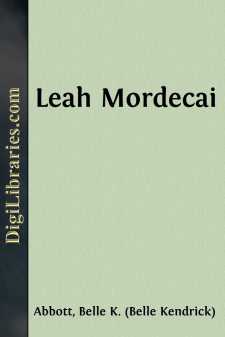Categories
- Antiques & Collectibles 13
- Architecture 36
- Art 48
- Bibles 22
- Biography & Autobiography 813
- Body, Mind & Spirit 142
- Business & Economics 28
- Children's Books 16
- Children's Fiction 13
- Computers 4
- Cooking 94
- Crafts & Hobbies 4
- Drama 346
- Education 46
- Family & Relationships 57
- Fiction 11829
- Games 19
- Gardening 17
- Health & Fitness 34
- History 1377
- House & Home 1
- Humor 147
- Juvenile Fiction 1873
- Juvenile Nonfiction 202
- Language Arts & Disciplines 88
- Law 16
- Literary Collections 686
- Literary Criticism 179
- Mathematics 13
- Medical 41
- Music 40
- Nature 179
- Non-Classifiable 1768
- Performing Arts 7
- Periodicals 1453
- Philosophy 64
- Photography 2
- Poetry 896
- Political Science 203
- Psychology 42
- Reference 154
- Religion 513
- Science 126
- Self-Help 84
- Social Science 81
- Sports & Recreation 34
- Study Aids 3
- Technology & Engineering 59
- Transportation 23
- Travel 463
- True Crime 29
Leah Mordecai
Description:
Excerpt
CHAPTER I.
THE giant clock on the wall in the assembly-room of Madam Truxton's fashionable school had marked the hour for dismission.
Groups of restless, anxious pupils stood about the apartment, or were gathered at the windows, watching the rain that had been falling in copious showers since morning. All were eager to go, yet none dared brave the storm.
Under the stone archway of the entrance to the assembly-hall, a group of four maidens stood chatting, apart from the rest, watching the rain, and impatient for its cessation.
"I know my father will either send my brother, or come for me himself," said Helen Le Grande, "so I need not fear the rain." Then, turning to the soft-eyed Jewess who stood by her side, she added, "When the carriage comes, Leah, you can take a seat with me. I'll see that you are safely deposited at home."
"Thank you, Helen, but it won't hurt me to walk. Nothing hurts me—Leah Mordecai the despised." Then, averting her face, the young girl gazed abstractedly into the street, and began humming in a low tone.
To these words of the young Jewess there was no reply. A certain sort of emphasis in her utterance seemed to forbid any inquiry, and silence any word of censure that might arise to the lips of her companions.
"How mean of me, not to offer a seat in the carriage to Lizzie Heartwell, too," thought Helen after a moment's reflection; "but I dared not, on account of my brother, who has so repeatedly urged me to make equals only of the rich. He little knows how I love Lizzie Heartwell, and whether she be rich or poor I know not, neither do I care."
"I say, girls," at length broke the silence, as the fourth member of the group, Bertha Levy, a Jewess too, spoke out, "think how stupid I am. Mamma has promised me a small tea-party to-morrow night, and this wretched rain had well-nigh caused me to forget it; but, thank fortune, it's giving way a little, and maybe we shall all get home after awhile. I'm desperately hungry! Of course, you will all promise me to come, and I shall expect you." Then, turning to Helen, she said, "Won't you?"
Helen assented.
"And you, Leah?"
"I will if I can. I am never sure of my movements, however."
"And you, dear Lizzie?"
"With the permission of my uncle and aunt; at any rate, I thank you for your kindness."
"Well, I shall expect you every one, and—"
"There comes the carriage," shouted Helen, as the liveried coach of the wealthy judge rolled round the corner, and drove up in front of the spacious school-building. "I knew my father would not forget me—yes, there is my brother."
The horses, thoroughly wet, looked dark and sleek as greyhounds, as they stood impatiently stamping the paving-stones, while a visible cloud of vapor rose from each distended nostril.
The coach door opened, and Emile Le Grande, with handsome, manly figure clad in a gray military suit, and equally handsome face, stepped out, and approached the group so impatiently watching the progress of the storm.
"Good morning, Miss Mordecai; I am happy that we meet again," said the gentleman, politely bowing....


